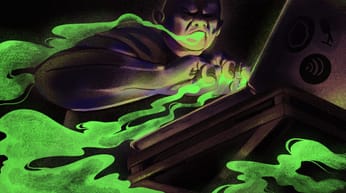
Jeepers threepers
Right-wing militia members work in the oil and gas industry, and the industry doesn’t seem to mind, a new DeSmog investigation claims.
Today's article is republished with permission from HEATED, a fantastic climate newsletter by journalist Emily Atkin. I contributed some reporting to the article, and I’m also a subscriber. HEATED is a must-read for anyone who cares about the future of planet Earth. Sign up HERE.

By Emily Atkin
Far-right, anti-government militia members “have established a prominent presence” at a major natural gas processing plant in North Dakota deemed “critical infrastructure” by the Department of Homeland Security, according to an investigation published in DeSmog on Tuesday.
Known as the Three Percenters—or “threepers,” as they call themselves—the group is named after the “dubious historical claim that only three percent of American colonists took up arms in the Revolutionary War.” The group has “long been active around the fringes of the white supremacist ecosystem,” according to The Center for Investigative Reporting, and is best known for providing armed protection to the deadly Unite the Right rally in Charlottesville, Virginia in 2017.
It appears the group is active in the oil and gas industry, too. According to Tuesday’s story by reporter Justin Nobel, Three Percenters are working at the Lonesome Creek gas processing plant near Watford City, North Dakota—and at other oil and gas facilities across the country.
To back up his claims, Nobel quotes former Lonesome Creek worker Paul Lehto, who says he quit his job at the plant in 2016 in part because of the growing threeper culture at the facility. “The constellation of issues around being a Three Percenter was probably the number one topic of conversation at work,” Lehto said.
Nobel also quotes Matt Marshall, a well-known Three Percenter running for state legislature in Washington, as saying prominent members are currently working all over the Bakken oil industry, as well as “in oilfields in Colorado, Texas, Wyoming, Oklahoma, and Alaska.”
Nobel mentions that Marshall was recently seen at a protest sporting an Aloha shirt, one of the markers of the emerging “boogaloo” movement. In the world of right-wing extremism, the movement has some overlap with the Three Percenter subculture but leans more heavily into the theory that a second Civil War is necessary in the United States. Law enforcement has linked boogaloo adherents to multiple crimes in recent months, including murders, attempted terror attacks, and even drug dealing.
And just last week, a federal grand jury brought firearms and explosives charges against a Pennsylvania businessman who used the Twitter handle “PghBoogey” after he was allegedly found with dozens of homemade explosives in his car. Kurt Cofano posted numerous racist statements online and allegedly talked about blowing up government buildings. He also owned Cofano Energy Services, which specialized in constructing oil and gas pipelines.
Additionally, Three Percenters have their own history of violence, as Nobel points out, including the 2018 bombing of a mosque in Minnesota.
In his interview with Nobel, Marshall essentially distanced himself from the violent elements of the movement and acknowledged the prominence of Three Percenters in the oil and gas business.
“Marshall basically told me, ‘This is where [Three Percenters] work. This is what we do: oil and gas,” Nobel said in an interview with HEATED on Tuesday. “He said he didn’t think that should be a concern. But I think that’s a point for society to argue over.”
Domestic terror expert “deeply alarmed”
Nobel’s investigation, linked here, is worth reading in full. But the most notable part is his interview with Daryl Johnson, a former senior domestic terrorism analyst at the Department of Homeland Security from 2004 to 2010.
Nobel said Johnson was “deeply alarmed” by the potential presence of Three Percenters at the Lonesome Creek plant and across the oil and gas industry.
“These are operationally minded people with a paranoid worldview that believe at some point there is going to be a societal collapse,” said Johnson, who authored the 2012 book, Right-Wing Resurgence: How A Domestic Terrorist Threat Is Being Ignored.
“What militias like this do is conduct surveillance and find facilities they will either need to take over or attack when ‘shit hits the fan.’ When they are working, they are also thinking about what else they would need to do to bring the plant to its knees. They may follow the order of their commander or act on a lone wolf instinct, and their allegiance lies not with their employer but with the militia, although they might think they are doing something righteous and good for the country.”
“Having the insider knowledge of how that plant operates, where that gas comes from and where it is going is all information an adversary can use for maximum threat and maximum damage. They can sabotage the plant or pipelines running from it, which may not cause a lot of deaths but can disrupt the energy supply.”
Furthermore, added Johnson, “There is also a counterintelligence threat. They have intel on critical infrastructure that, shall the need arise, they can share with people who don’t need to know.”
Plant owner dismisses security concerns
The Lonesome Creek gas processing plant is owned by one of the largest natural gas corporations in the country: ONEOK. (Pronounced “One-Oak”).
Though not as large or well-known as, say, Exxon or Chevron, ONEOK is a powerhouse public company, included in the S&P 500 and the Fortune 500. The Tulsa-Oklahoma-based company either owns or has interest in a considerable share of America’s energy infrastructure, including an “extensive network of natural gas gathering, processing, storage and transportation assets.”

A map of ONEOK’s assets. Source: oneok.com
Lehto, the former Lonesome Creek worker, told Nobel that he did not believe ONEOK took his concerns seriously. While the company “does regularly solicit information in the area of ethics, safety, and legality,” he said, “there is very little evidence in my experience of either taking action on them or even responding in a substantive manner.”
Indeed, ONEOK did not respond substantively to Nobel’s inquiries about militia activity at the plant, according to an email exchange provided to HEATED. The company said that their policies prohibit “violence, violent acts, and threats of violence.”
ONEOK has implemented numerous safety and security practices to safeguard our facilities and to comply with applicable law. Clearly, the scope and nature of many of these practices and safeguards must remain confidential.
HEATED also reached out to ONEOK following publication of Nobel’s story, with the following questions.
- Does ONEOK agree with concerns about the potential presence of violent militia members at a facility deemed critical infrastructure by the Department of Homeland Security? If so, how does the company plan to address these concerns? If not, why are those concerns not valid?
- Was ONEOK aware of the potential presence of militia members before this story came out?
- Does ONEOK have policies in place to prevent members of extremist militant groups from working at major plants like Lonesome Creek?
ONEOK gave the exact same response it gave to Nobel.
Environmentalists are threats. Right-wing militias are not.
ONEOK is a politically active company. It paid more than $1.1 million in membership dues alone to state and national industry groups in 2019, including nearly $500,000 to the American Petroleum Institute (API), which has worked to pass anti-climate policy on both the local and national level.
One of the policies API has worked to pass on the state level is called the Critical Infrastructure Protection Act, which attempts to impose criminal punishments on people “who commit ‘sabotage’ of critical infrastructure,” like pipelines and gas processing facilities.
The people these bills target, however, are not right-wing militia members who work for pipeline and gas companies. They target environmentalists who are protesting them.
In terms of potential security threats to American oil and gas infrastructure, Nobel says his story raises questions about prioritization—not just by the industry, but by the FBI. According to the Center for Strategic and International Studies, right-wing terrorism represents the most significant domestic terror threat; and the FBI is struggling to contain it.
“The FBI has spent a lot of resources following environmental movements and following social justice movements, and yet the right wing militia groups do not seem to have received a similar sort of attention,” Nobel said. “There could be interesting reasons why, but they won’t answer those questions.”
Correction, July 22: A previous version of this story misspelled Justin Nobel’s last name.
Like The Informant and want to help make it even better? Give me feedback, point out factual errors or typos, or send me news tips. Reach me at nick@informant.news.
Subscribe to The Informant to receive the latest updates.






